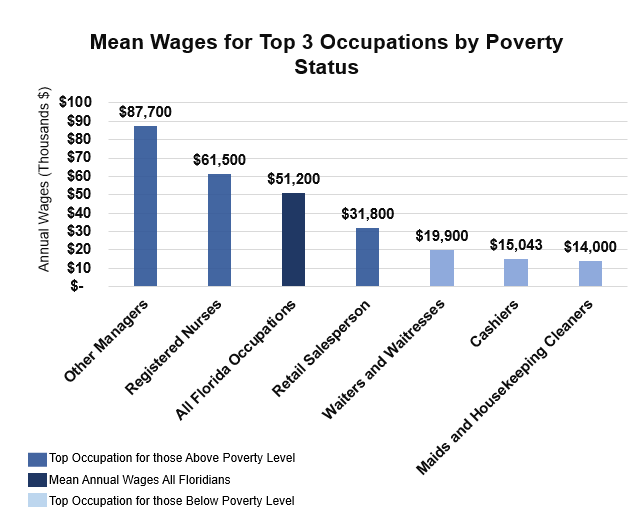Analyzing the Top 3 Occupations by Poverty Status in Florida
Metrics That Matter - A Look at Job Opportunities as a Root Cause of Poverty
By: Sheridan Meek, Research Economist, Florida Chamber Foundation
It is common to hear leaders talk about strong career pathways that provide individuals with a path to prosperity. But what does that mean? Of course, a “good” job can be subjective, but in terms of using it as a measure to support someone going from poverty to prosperity, an important factor to consider would be the wage associated with the position.
Taking a unique look at one of the ten root causes of poverty, “job opportunities,” our team researched and analyzed occupations most common for those not living in poverty vs. occupations most common for those in poverty. Additionally, we outlined the average salaries associated with each of these occupations.

Of the top three occupations for those living in poverty (Waiters and Waitresses, Cashiers, and Maids and Housekeeping Cleaners), none generally require a post-secondary degree or certification, and in some cases, do not require a high school diploma. While there are an increasing number of well-paying occupations that do not require post-secondary degrees, specialized training, credentials, and certificates of value are increasingly playing a role in the hiring process for high-value careers. This can be seen plainly in those top three occupations for those above the poverty line (Other Managers, Registered Nurses, Retail Salesperson).
The prevalence of lower-paying occupations with lower education requirements for those in poverty highlights the importance of education in the pathway to prosperity. Accessibility and awareness of pathways to job opportunities are crucial to earning an annual wage above the poverty level, and these opportunities can be limited by educational attainment – which begins in early education and stretches to high school and beyond.